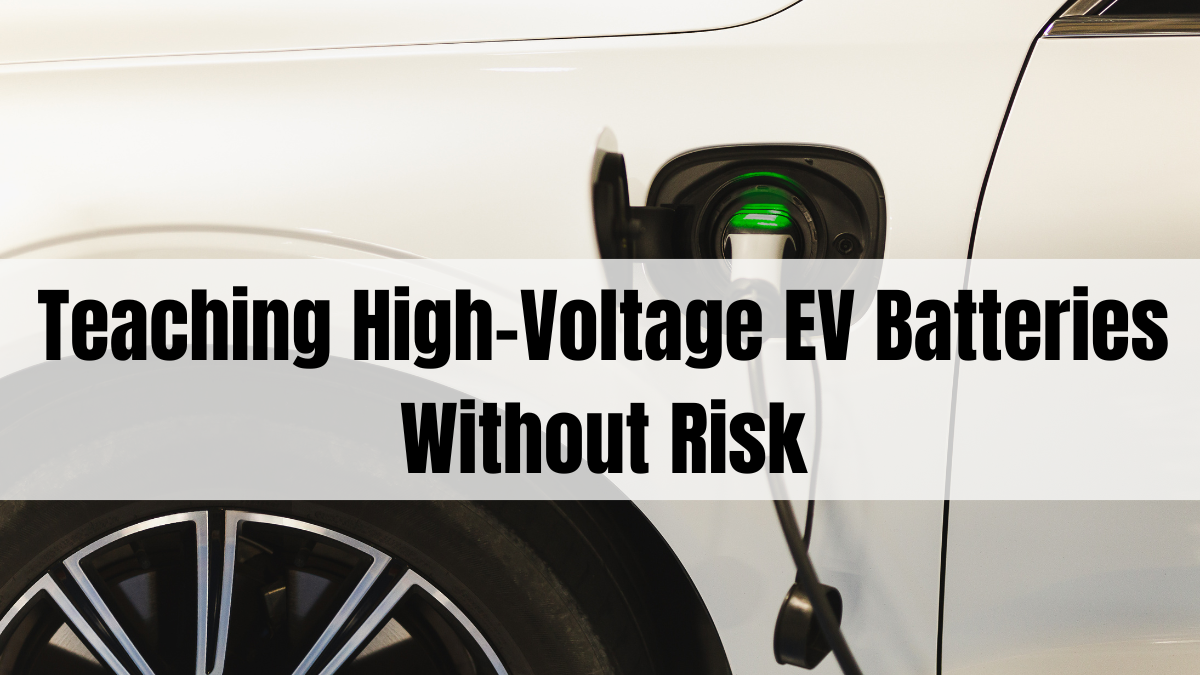Electric vehicles (EVs) are becoming the new normal, and with them comes a powerful — and potentially dangerous — component: the high-voltage battery. Training tomorrow’s technicians to handle these systems is crucial, but it must be done with precision, safety, and the right tools. That’s why high voltage battery training is now a centerpiece of EV education programs worldwide.
Whether it’s a 400V system in a hybrid or an 800V pack in a full electric car, improper handling can lead to life-threatening situations. Fortunately, new lab tools and training protocols are helping educators deliver safe, hands-on learning without compromising realism or depth.

The Risks of High-Voltage Systems in EVs
High-voltage batteries store large amounts of energy, enough to power an entire vehicle — or cause serious harm if mishandled. Students need to understand:
-
Battery isolation and deactivation protocols
-
Arc flash and shock prevention
-
Insulated tool usage and protective gear
-
Cell structure, thermal runaway, and fire risk behavior
Because of this, high voltage battery training requires a different level of precaution and setup compared to traditional 12V vehicle systems.
Modern Tools That Make Training Safer
EV training centers now use specialized tools and training modules to simulate high-voltage environments without exposing students to actual danger. These include:
-
Battery pack mock-ups with non-live circuits and simulated voltages
-
Modular battery system trainers with fault injection and live display readouts
-
Digital lockout-tagout (LOTO) stations to teach deactivation safety
-
Personal protective equipment (PPE) kits integrated into training routines
-
Thermal monitoring systems that detect overheating during hands-on tests
These tools allow students to develop critical diagnostic and safety skills in a classroom or lab setting with zero actual high-voltage exposure.
Step-by-Step Safety Curriculum for Technicians
A good high voltage battery training program includes structured stages of safety learning:
-
Theory and Safety Principles
Students learn how high-voltage systems work, their risks, and legal safety standards (OSHA, ISO 6469-3). -
Hands-On Simulation
Using mock batteries or low-voltage trainers, students practice opening packs, testing voltages, and identifying shutoff points. -
Fault Diagnosis Exercises
With safe trainers, instructors introduce simulated faults like insulation resistance failure or contactor sticking. -
Live Pack Demonstration (Optional)
In advanced courses, students observe — not directly handle — real packs under instructor supervision.
This phased learning structure builds both skill and confidence in future EV technicians.
Certification and Industry Alignment
High-voltage battery skills are now required by major employers in the EV industry. Leading programs align training with certifications such as:
-
ASE L3 (Light Duty Hybrid/Electric Vehicle Specialist)
-
IMI Level 3 Award in Electric/Hybrid Vehicle System Repair and Replacement
-
Manufacturer-specific EV programs (Tesla START, Toyota T-TEN EV modules)
High voltage safety protocols are also taught in accordance with standards like NFPA 70E and ISO 26262 for functional safety.
Making EV Labs Accessible for All Schools
Cost and safety concerns once made high voltage battery training difficult for small institutions. But new scalable solutions are changing that:
-
Compact trainers that simulate full pack behavior without real voltage
-
Hybrid learning kits for use in blended classrooms (in-person + online)
-
Instructor dashboards to monitor and control student exercises in real time
These innovations ensure that even schools with modest budgets can offer quality, industry-relevant EV battery training.
FAQs
What is high voltage battery training?
It’s a specialized training program that teaches automotive students and technicians how to safely work with electric vehicle battery systems, especially those over 60V.
Why is it important in EV education?
Because mishandling high-voltage batteries can be deadly, training ensures technicians know how to test, service, and diagnose EV systems with full safety protocols.
What tools are used in these training programs?
Simulators, mock battery modules, LOTO stations, PPE kits, thermal sensors, and digital monitoring tools are used to deliver safe and realistic training.
Are there certifications for high-voltage battery handling?
Yes. Certifications include ASE L3, IMI Level 3, and various manufacturer-led programs. These boost employability in the growing EV technician job market.
Can small colleges afford to offer this training?
Yes. Affordable simulation kits and hybrid learning tools now make high-voltage battery education possible even for smaller institutions.
Click here to know more.
